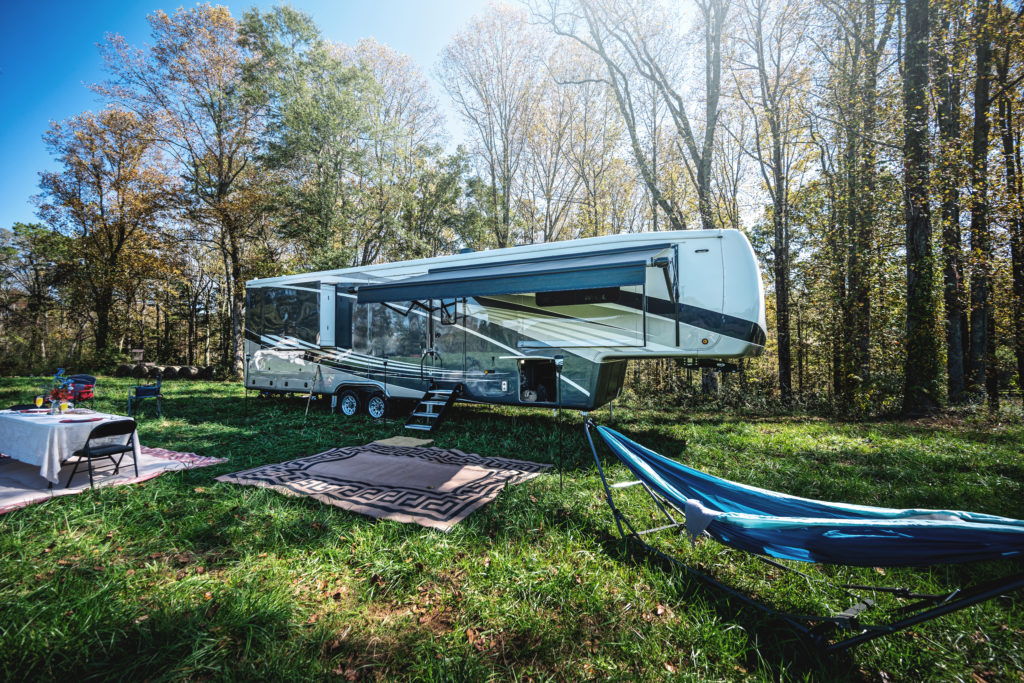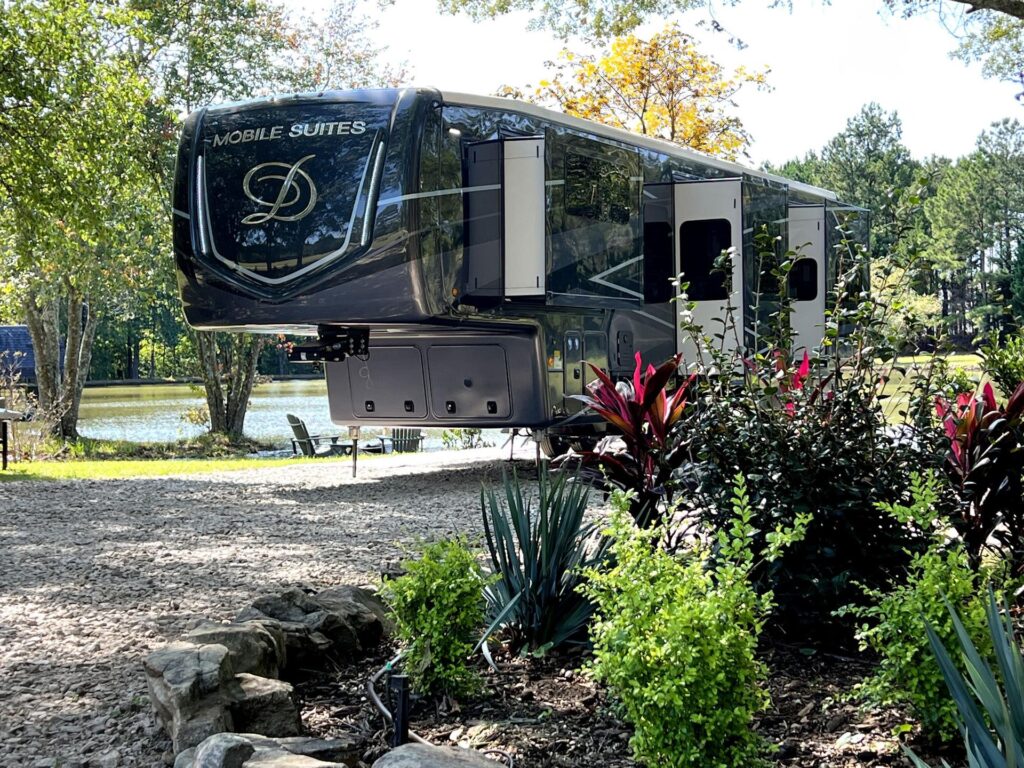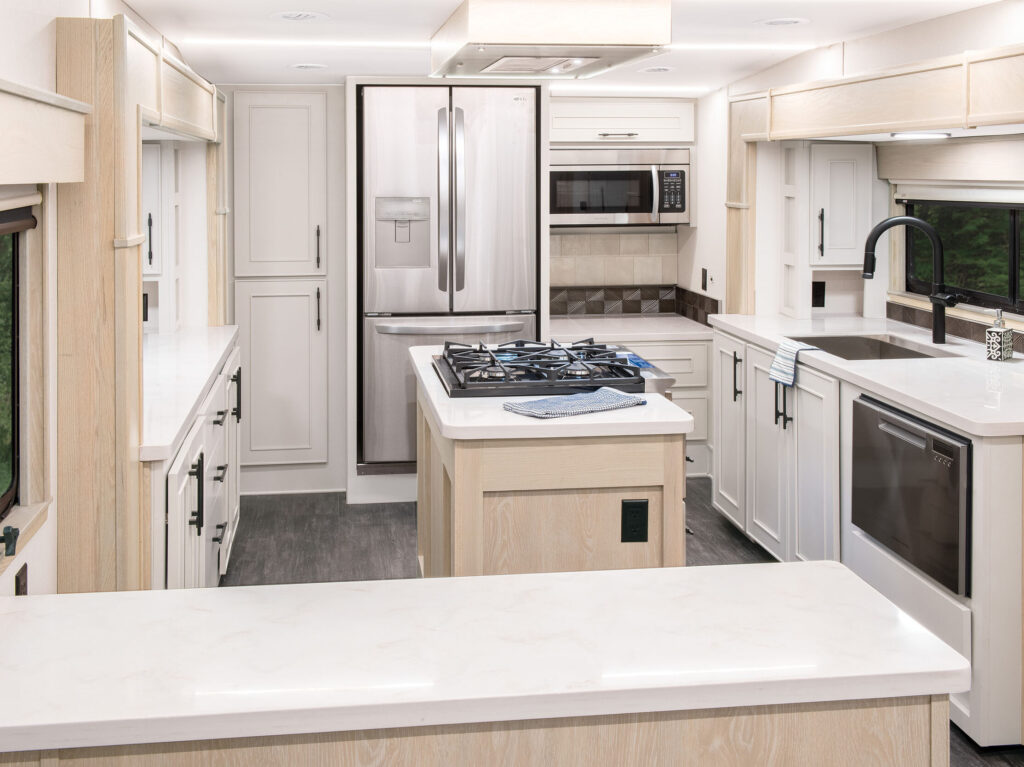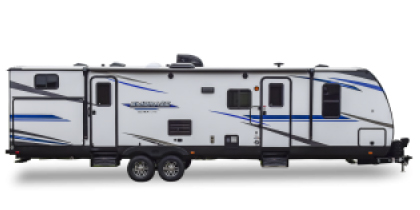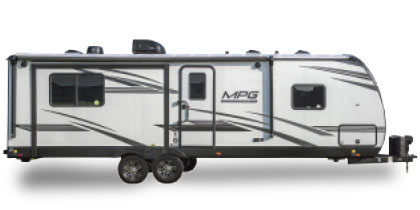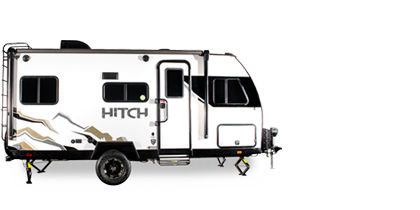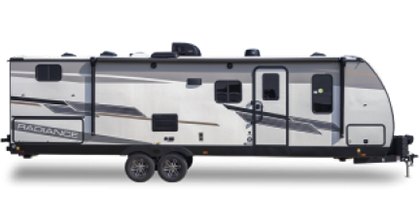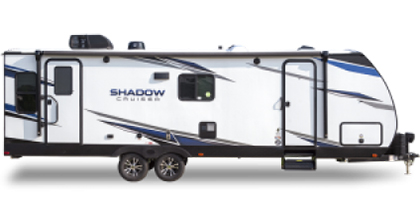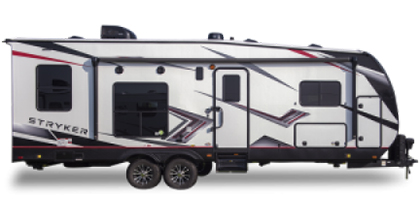Researching and buying an RV is a significant undertaking, especially if it’s your first. It’s a big budget item that has to function as a house and a vehicle, holding all your travel gear, protecting you from the elements, and keeping you and your valuables safe on the road. To cap it all off, it needs to be as relaxing as home, with similar decor and features that provide comfort at the end of a long day.
So when it comes to such an important decision, research is vital. At DRV, we want you to find your ideal RV, which is why we’ve created this buyer’s guide. We’ll help you ask the right questions to find your perfect RV and travel in style for years to come. Because there’s nothing better than camping, surrounded by nature, with the peace of mind that you have exactly what you need.
Overview of RV Types
All RVs fall into two top-level categories: motorized or towable. Motorized RVs have an onboard motor, with a coach built atop a commercial vehicle base capable of supporting heavy loads, like a truck, bus or van chassis. Towable RVs attach to a separate tow vehicle, which is most often a heavy duty pickup truck.
Between those two main categories, there are six sub-types of RVs:
Motorized RVs:
- Class A – large RVs built on a commercial truck or bus chassis
- Class B – medium-sized RVs built on a van chassis
- Class C – RVs built on a commercial truck chassis with an overhanging section above the cab
Towable RVs
- Travel Trailers – extra small to large trailers that can be towed with a range of tow vehicles
- Toy Haulers – larger trailers with a garage space suitable for hauling motorized toys, requiring a heavy duty truck to tow
- Fifth Wheels – medium to large trailers characterized by a towing hitch that provides greater security for heavier loads, requiring a heavy duty truck to tow
Within these designations, RVs can also be categorized by their primary attributes, including light or ultralight, mini or small, luxury, minimalist, all-season, suitable for full-time living, etc.
The first step in narrowing down RV types is knowing what you’ll need. For instance, a fifth wheel that’s suitable for full-time living will have a different set of features and amenities than a miniature trailer used for weekend trips only in the summer months.
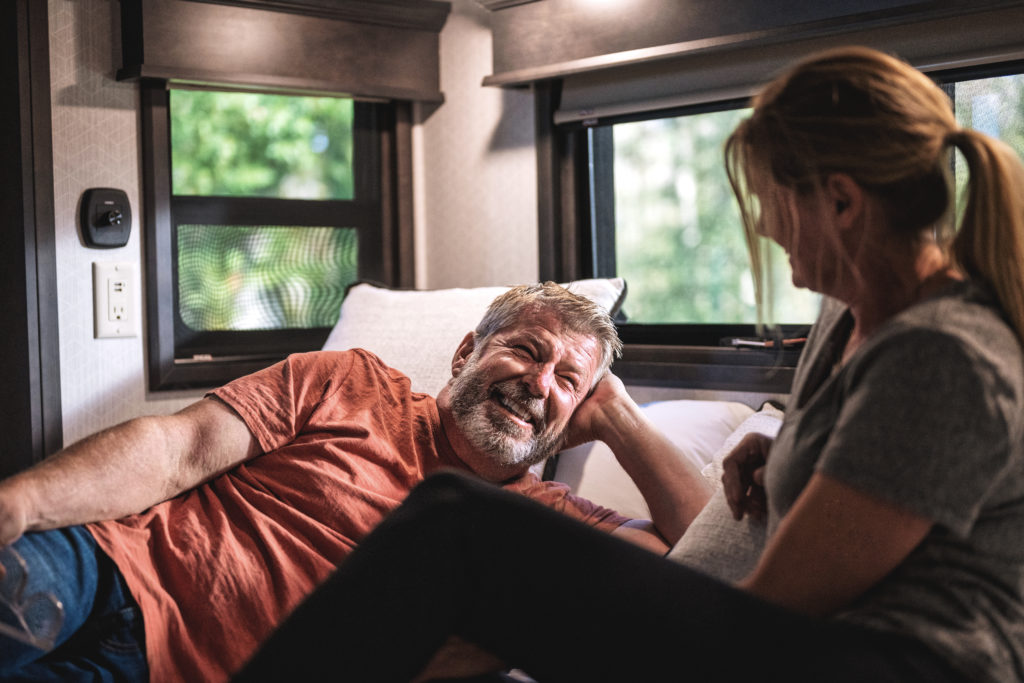
At DRV, we specialize in making high-end fifth wheels with uncompromising quality, residential construction and luxurious amenities. Mobile Suites includes all the finer comforts of home, while Full House adds all-season comfort for full-time living, with options for a toy hauler garage.
What to Research
As you begin researching the wide variety of available RV models, there are a number of things you’ll want to consider. Knowing which questions to ask can save you time and help you narrow down your options. These are our recommendations for areas to research and details to learn more about.
Types
Now that you know the basic differences between types of RVs, you’ll want to consider the finer details of each type to find which models suit your needs best. You may find the following questions useful:
- Do you want to drive your RV or tow it with a separate vehicle?
- Do you just need room for weekend essentials or more generous storage for longer-term travel?
- What length and weight of RV do you feel comfortable handling with the towing or driving experience you already have?
- Are you willing to buy a separate or upgraded tow vehicle to handle a heavier RV?
- How many beds would you like to have available for yourself and guests?
- Which amenities of home are the most important to you – a gourmet kitchen, luxurious bath, televisions and WiFi, decor, room for a larger family, etc.?
- What’s your budget range?
- Do you need special storage for motorized or non-motorized toys, like golf carts, kayaks, side-by-sides, and more?
- Will you travel to climates with freezing temperatures where you would need a winter-rated RV package?
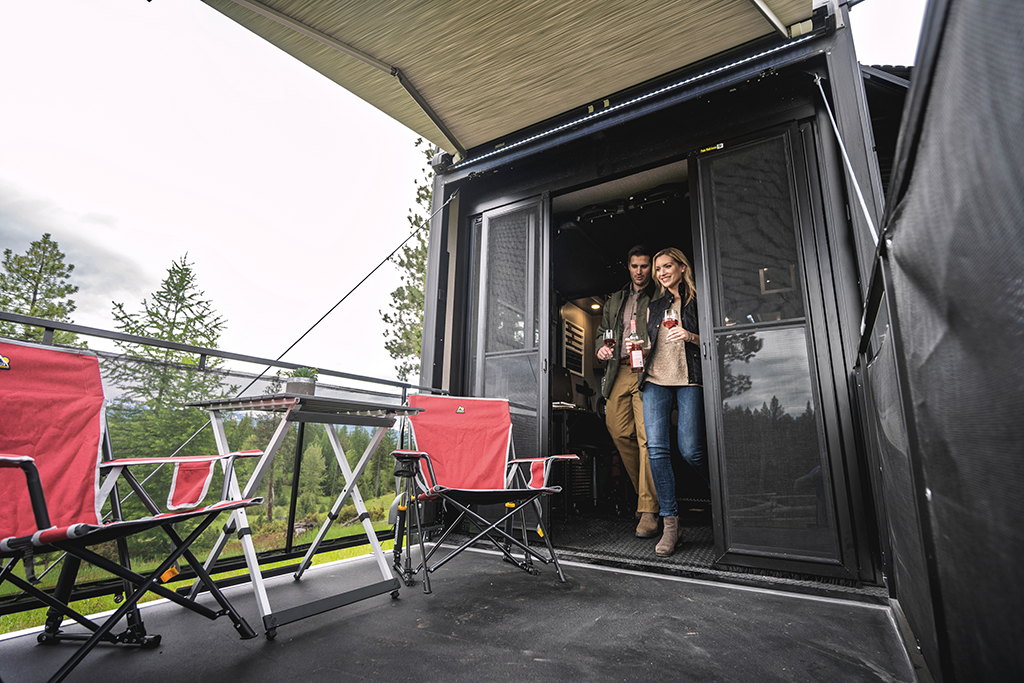
RV Manufacturers and Brands
Each RV manufacturer has its own set of values, priorities, building processes, specialties and warranties – so it’s worth it to research which manufacturers align with your own preferences. Within manufacturing companies, there may be sub-brands tailored to meet specific market demands. For example, some brands are designed to be more sporty and rugged, while others specialize in tiny, minimal RVs that are easy to transport but light on amenities. By researching which companies and sub-brands specialize in the specific RV types, construction and amenities you prefer, you’ll be able to narrow down your options more easily.
Sizes and Weights
Different sizes and weights of RVs will come with different benefits and drawbacks. Smaller, lighter RVs can be easier to tow and better for gas mileage, but may not be rated for camping in more extreme temperatures. Longer, heavier RVs can come with improved storage and incredible amenities, but may require you to purchase or upgrade your tow vehicle to handle the RV properly.
Here are some additional size- and weight-related questions to consider:
- Will you be camping frequently in places that may restrict the maximum length or height of your RV?
- Do you plan to stay in any high-end RV resorts which might require specific minimums for the size of your RV?
- Do you plan to camp off the beaten path in areas where a larger, heavier RV may be cumbersome on unpaved roads?
- Are there any unavoidable height limitations for places you may want to travel to, or routes you’ll want to take?
- What are the standard dimensions of campsites you intend to visit? Are there pass-through sites available, or if not, will you be comfortable backing a longer RV into a designated space?
Towing Capability
If you purchase a towable RV, you’ll need to match it with an appropriate tow vehicle capable of handling its weight and size. Tow vehicles that may be capable for one RV may not have enough power to handle another. Some questions to ask are:
Do you currently own a vehicle capable of towing an RV?
- If so, does it have enough power to safely handle the size and weight of the RV you’re considering, or would you need to upgrade to something more capable?
- If you’re looking at fifth wheels, do you have a pickup truck where you can install the fifth wheel hitch?
- If you plan to purchase a motorized RV, will you want to tow a car or truck behind it so you can have a vehicle to drive once you park at your campsite?
- What tech features might you want in an RV to help make towing easier or safer?

Floor Plans and Storage
Two more important considerations in your search for your ideal RV are floor plan styles and storage. With so many different RV models on the market, there’s a nearly endless variety of floor plans to choose from. You might prefer a coach with a bunkhouse for guests, a second bathroom or slides that provide additional floor space in key areas. Floor plans and storage go hand-in-hand, with some floor plans naturally offering additional space. But most RVs will have a variety of storage areas, from basement storage outside to under-bed space, walk-in closets or oversized pantries inside. In order to narrow down your options, contemplate:
What’s the maximum amount of people you might travel with (such as friends or family), and how many beds would you need to have available?
- If you’re traveling with children, guests or pets, would you like a separate bunkhouse area away from the main bedroom?
- Would you prefer a large, luxurious bathroom or a second bathroom? Or are you comfortable with just a modest bathroom inside the coach, knowing you can access campground facilities as needed?
- Would you prefer a full kitchen with gourmet appliances in order to cook your own meals, or would you rather save space in the kitchen to gain it elsewhere?
- Considering how long you plan to travel, how much storage do you think you’ll need for clothing, food, toiletries, sports equipment and more?
- Would the extra garage space in a toy hauler be useful aside from hauling toys, such as for flexible sleeping space, a playroom or exercise room, or an indoor patio to corral small children or pets?
- Are there any other particular features you need in an RV that you might find in a floor plan?
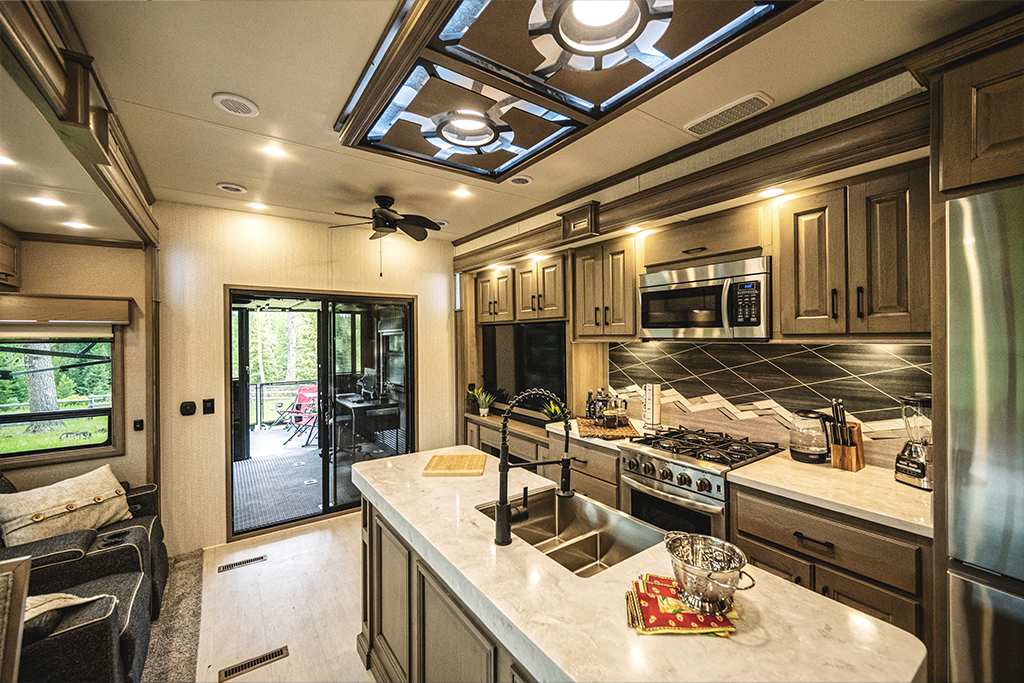
Amenities
RVs can offer a range of amenities from the bare-bones basics to high-end technology, decor and appliances. Depending on your preferences, you may find an extra-small RV comfortable for short weekend trips but not long-term travel, or you may love a premium model for resort camping but not boondocking. Think about the following:
- Which comforts of home do you absolutely not want to live without?
- Are there features in specific areas you want to prioritize, such as kitchen appliances, specific bathroom elements, entertainment system equipment, etc.?
- How important is it to you to have modern decor and finishes?
- Do you plan to watch TV or movies frequently, or listen to music often enough to seek out higher end electronics?
- Are there technological features that you’d like to have, like push-button leveling, electric slides, tank monitors, backup cameras, etc.?
- Are there weather- or temperature-related features you might need, like a high-powered furnace or air conditioning unit, an enclosed underbelly, insulated pipes, a fireplace, exterior awnings, etc.?
- Would you like to have specific features in the master bedroom, like washer/dryer prep, a second television, underbed storage, walk-in closets, CPAP storage, etc.?
Full-Time vs. Part-Time RVing
Not every RV is appropriate for full-time living or for use in colder temperatures. If you plan to live in your RV full-time (for all or part of the year), look for features and warranties that account for that kind of use. RVs specially designed to withstand colder weather will typically state that upfront and include components that ensure low temperatures don’t damage your coach.
Your preferred camping locations can also play a part in deciding which RV to buy. People who enjoy camping off-grid, or boondocking, may want to look for models with onboard generators or solar panels, larger fresh water tanks and smaller appliances that draw less power. If you’ll only stay at campsites with full hookups, you might prioritize a higher level of comfort with bonus amenities, knowing that you’ll have a healthy supply of electricity and fresh water, and plenty of access to waste removal stations.
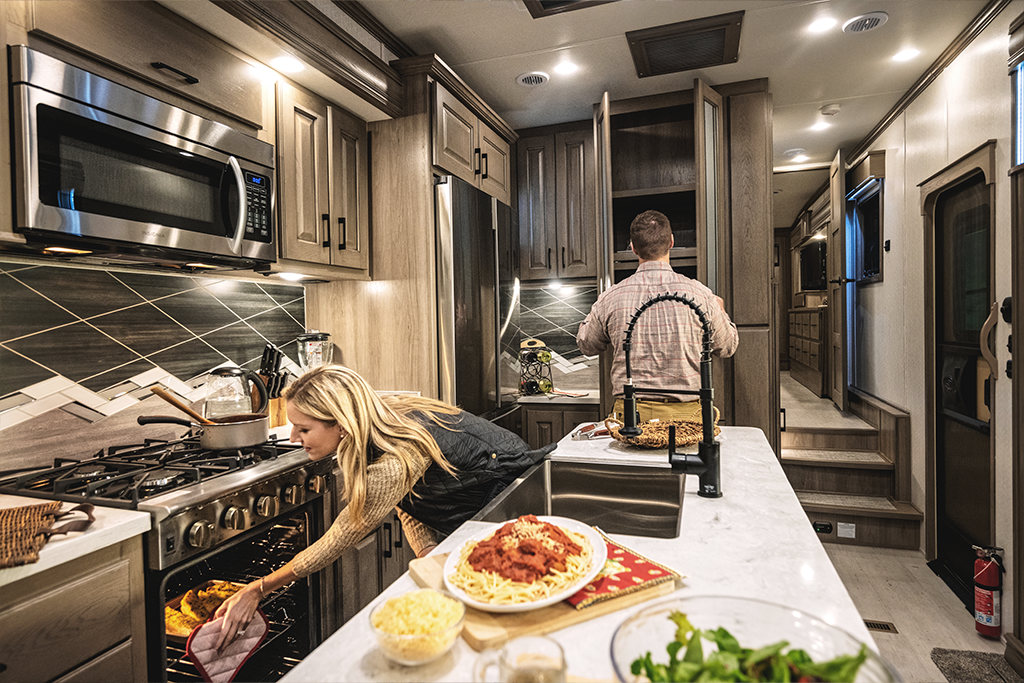
Additional Costs
Owning an RV can result in additional unforeseen costs if you haven’t done thorough research. Choosing a luxury toy hauler might mean you also need to buy a heavy-duty pickup truck to tow it. Larger, heavier models can require more gas to tow than other options, so if you plan on a cross-country trip or moving campsites frequently, you might want a lighter model. Certain camping destinations may have requirements for RVs, like length limitations for older campsites, or length minimums and restrictions on RV types for more expensive resorts.
Taking Ownership of Your New RV
When you’ve purchased an RV and you’re getting ready to take ownership, keep these suggestions in mind:
- Don’t schedule pickup for the end of the day or when the dealership will be closed the next day, in case you have issues or you may need assistance early on. For your first night, you may want to camp near the dealership, so if any issues or questions arise, you’ll be close to the service center.
- As the dealer gives you a walkthrough tour of your new RV, consider filming it with your phone or camera to capture all the details. That way, you’ll always have a video to refer back to with questions that might be easily answered, such as the location of specific RV elements or the processes for engaging specific features.
- Give yourself plenty of time to arrive, tour the RV and get settled before you leave the dealership.
- Also, unless you’re a camper experienced with an RV similar in length and weight to the one you’re picking up, you may want to plan your first drive to stay off freeways or busy roads at rush hour while you get a feel for how the RV handles and build your confidence driving it.
The Most Important Step
After you’ve done all your research, narrowed down your options and purchased your perfect RV model, there’s one last thing to do: plan an amazing journey and have a wonderful time. With proper care and maintenance, your RV will provide you and your family with rich experiences you’ll treasure for years to come. So here’s to a lifetime of adventure and the kind of memories that make life worthwhile.

